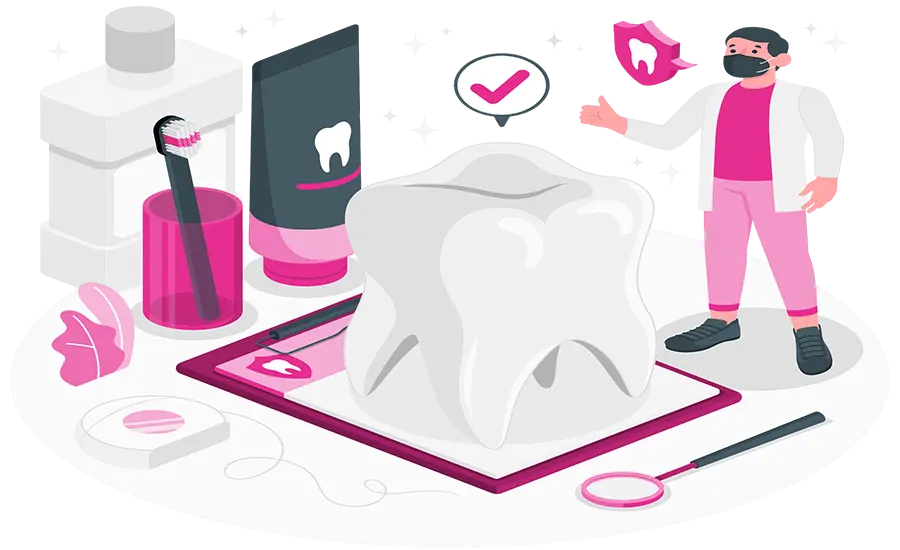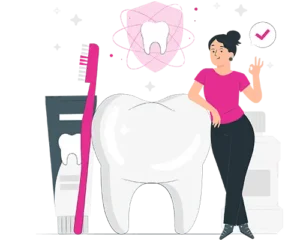Choosing a career for yourself can feel like a never-ending checkup, complete with questions about job satisfaction, work-life balance, and, of course, salary. For those considering a career in dentistry, one question is a must: how much does a dentist make?
As of March 11, 2024, ZipRecruiter showed that the average annual pay for United States Dentists is $189,979. Let’s explore other related details!
Table of Contents
ToggleHow much does Dentist make Hourly, Weekly Monthly, and Annually?
| Type of Dentist Income | Amount |
| Hourly Income | $91.34 |
| Weekly Income | $3,653 |
| Monthly Income | $15,831 |
| Annual Income | $189,979 |
How do Dentists make money?
There are three main paths for dentists to earn income:
- Employment
- Self-employment
- Through own online consultancy
Let’s delve into each option in detail
Employment
After dental school, dentists have several employment options such as;
Associate Dentist
This is the most common option for new dentists—employed for a dental practice at a private clinic and receiving a salary or production-based compensation (percentage of what they bill).
The range of salaries can be considerable and is influenced by several things, including; experience, location, and if the practice is general or specialized. An American Dental Association survey for 2021 found the average starting salary for a general dentist was $147,350.
Corporate Dentistry
Some Dentists work for large dental corporations, these corporations operate multiple practices. They pay a set salary and give full benefits. While the salary could be less than private practice, the work-life balance is often better and the benefits are more comprehensive.
Teaching or Research
Dentists teach at dental school. Many clinical and basic science areas need more qualified lecturers and researchers.
Government/Public Health
Working in government or public health jobs is an option for them. Dentists could work for local, state, or federal programs that help provide dental care to populations that are traditionally underserved. These are often less paying but could be more rewarding to dentists who are interested in the chance to help make a difference.
Self-Employment
Owning a Dental Practice
This is the most lucrative path for dentists, but it’s also the most demanding. Practice owners oversee all aspects of the business, from hiring and firing staff to financial planning to marketing. The potential income is high, but it takes a good long while to get there, especially when substantial initial investments (e.g. real estate property, technology upgrades, etc.) are required.
Venture into New Businesses
Some dentists leverage their expertise in business to diversify their income in a variety of ways — including writing books, creating educational materials, developing dental products, advising or serving on the board of dental companies, and investing in related businesses.
Online Consultancy
Online consultations bridge location gaps, expanding their reach while still delivering personalized care that builds trust and loyalty. They utilize the following strategies for their online consultancy.
-
Website Creation
Dentists typically spend a lot of money to develop professional websites that reflect their expertise and services. This virtual clinic not only builds trust; it also prompts potential patients to ask about services and make appointments
Don’t Have a Website to showcase your expertise?
We recommend you have a well-designed, user-friendly website
Get our website development services now!
-
Social Media Marketing (SMM)
Social media marketing is utilized to reach out to the community by providing sound tooth care knowledge. Through platforms like Facebook and Instagram, Dentists share dental care tips and introduce their team members. Sometimes, it results in success stories from patients.
We suggest you leverage Social Media to boost your business!
-
SEO for Dental Clinic
Invest in SEO to make sure their local clinic turns up in local search results, dentists use local SEO tactics. By sprinkling the content with relevant keywords, they focus on people actively seeking dental services in their area. Ultimately, it increases the visibility of online clinics.
We know that you don’t have the time and expertise to do SEO optimization. We are here to help you with custom SEO services for dental clinics.
Top 10 Highest Paying Cities for Dentist Jobs
| City | Annual Salary | Monthly Pay | Weekly Pay | Hourly Wage |
|---|---|---|---|---|
| Corcoran, CA | $304,395 | $25,366 | $5,853 | $146.34 |
| Malibu, CA | $240,577 | $20,048 | $4,626 | $115.66 |
| Justin, TX | $240,554 | $20,046 | $4,626 | $115.65 |
| Berkeley, CA | $236,770 | $19,730 | $4,553 | $113.83 |
| Fort Belvoir, VA | $236,162 | $19,680 | $4,541 | $113.54 |
| North Bergen, NJ | $231,274 | $19,272 | $4,447 | $111.19 |
| Groton, MA | $230,268 | $19,189 | $4,428 | $110.71 |
| Renton, WA | $229,125 | $19,093 | $4,406 | $110.16 |
| Rohnert Park, CA | $228,495 | $19,041 | $4,394 | $109.85 |
| Santa Monica, CA | $227,394 | $18,949 | $4,372 | $109.32 |
Data source: ZipRecruiter
Top 5 Best Paying Dentist Jobs in the U.S
| Job Title | Annual Salary | Monthly Pay | Weekly Pay | Hourly Wage |
|---|---|---|---|---|
| Temp Pediatric Dentist | $277,314 | $23,109 | $5,332 | $133.32 |
| DDS Dentist | $210,137 | $17,511 | $4,041 | $101.03 |
| Contract Dentist | $189,979 | $15,831 | $3,653 | $91.34 |
| Dental Director | $157,801 | $13,150 | $3,034 | $75.87 |
| Senior Dentist | $153,749 | $12,812 | $2,956 | $73.92 |
Dentist-Related Resume Skills and Keywords
To enhance job prospects and salary potential, they should focus on key skills such as Dentistry, Patient Care, Clinic, Surgery, and Treatment Planning, according to ZipRecruiter’s analysis of job descriptions.
How much do similar professions get paid in the United States?
| Profession | Average Annual Salary (USD) |
|---|---|
| Dentist | $189,979 |
| Orthodontist | $285,617 |
| Surgeon | $297,848 |
| Periodontist | $223,466 |
| Relocation Assistant | $62,417 |
| Chief Dental Officer | $172,888 |
| Dental Hygienist | $100,100 |
Data source: Indeed
10 Benefits of Being a Dentist
Dentists play an important role in maintaining the oral health of individuals. In return, they also get perks of advantages including:
- Health Insurance: Provides coverage against medical expenses, allowing them to obtain healthcare services as needed.
- AD&D Insurance (Accidental Death & Dismemberment): Provides financial security to them as well as their dependents in the event of accidental death or severe injury. It is a kind of additional security on top of standard life insurance.
- Continuing Education Credits: Supports continuing education, making it possible for them to keep abreast with the latest developments in dentistry.
- Dental Insurance: Can provide coverage for treatment of dental disease so that they can take care of their oral health.
- Flexible Schedule: Allows them the freedom to manage life and work in good balance, thus contributing to a healthier existence.
- Paid Time Off: Provides time for relaxation and recovery, they need to cultivate a state of overall well-being.
- Malpractice Insurance: Defends dentists from legal claims, thereby providing financial security against professional liability.
- Opportunities for Advancement: Provides the direction for career advancements, so they have an incentive to strive for continued professional development.
- Loan Assistance: This makes it easier to return student loans, thus making education a more manageable financial burden.
- Vision Insurance: Dental education also offers coverage of eye care, ensuring that they maintain optimal vision health.
Factors that Determine a Dentist’s Income in the USA
Many factors are involved in determining their income including:
- Experience: New dentists generally start with lower earnings, which increase progressively as they gain experience and build a patient base. Established ones with loyal clientele often command higher salaries
- Location: Location is a large factor for compensation. Typically, urban areas with higher living costs associated with increased demand for dental services offer higher salaries, while rural areas and smaller towns usually have lower salaries.
- Practice Type: Whether they own their practice, work in a group setting, or are employed by a hospital or public health facility can influence their salary. Ownership provides the potential for higher earnings but involves additional business management responsibilities.
- Specialty: General dentists earn less than specialists like orthodontists, oral surgeons, or periodontists on average simply because of the increased proficiency needed for training in specialized fields.
- Practice Efficiency: Those who efficiently manage practice schedules, optimize patient appointments, and minimize overhead costs often earn higher incomes.
- Years of Education: Those with advanced degrees such as a Master’s or Ph.D. give them slightly more money.
- Continuing Education: Attending scientific seminars, and courses, and learning the newest developments through seminars and courses can enhance skills and earning potential.
How to Achieve Success As a Dentist: Step By Step Guide
Success requires a combination of clinical proficiency, patient care excellence, and business acumen. On your path toward becoming an influential dentist:
Step 1. Polish Your Clinical Skills
Education and Training: Acquire a Doctor of Dental Surgery (DDS) or Doctor of Medicine in Dentistry (DMD) degree before passing state licensure exams and considering specialization for increased expertise.
- Continued Learning: Attend conferences, workshops, and hands-on courses regularly to stay abreast of new advancements in dentistry materials, and techniques.
- Master the Technical Aspects: Hone and perfect clinical skills that enhance precision, efficiency, and patient comfort during procedures.
Step 2. Outshine in Patient Care
- Establish Bedside Manner: Establish rapport with patients through friendliness, empathy, and attentiveness; active listening is crucial, and clear communication must take place with patients.
- Focus on Patient Education: Simplify procedures, answer inquiries in-depth, and empower patients to make more informed choices about their oral health.
- Prioritize Pain Management: For patient comfort, ensure effective pain-management techniques and anxiety-reducing options.
Step 3. Establish an Effective Practice
- Location is Key: Choose a strategic location with easy access and a patient population that aligns with your practice focus.
- Foster an Engaging Experience: Create an inviting clinic atmosphere by designing one with modern features like clean surfaces and comfortable furnishings to improve patient experiences.
- Leverage Technology: Invest in cutting-edge dental equipment and software to increase efficiency, accuracy, and patient satisfaction.
- Effective Marketing: Implement marketing strategies such as an online presence, local outreach efforts, and patient referral programs to attract new patients.
Step 4. Business Acumen
- Financial Management: Understanding and managing practice finances effectively includes understanding overhead costs, insurance billing processes, and revenue generation processes as well as developing revenue opportunities for practice expansion.
- Teamwork and Leadership: Form an effective team, creating an open and productive work environment.
- Be Open to Change: Stay informed on changing dental trends, regulations, and patient expectations to adapt your practice as necessary.
Step 5. Personal Well-Being
- Strive for Work-Life Balance: Put the health and well-being of both body and mind first when managing work responsibilities to avoid burnout, including scheduling breaks, engaging in hobbies, and seeking support from coworkers or mentors.
- Engage in Lifelong Learning: Dentistry is an ever-evolving field; stay curious, passionate, and committed to continuous development and advancement of yourself.
Top Companies for Dentists in the United States
| Dental Center | Average Salary |
|---|---|
| Nuvia Dental Implant Center | $402,757 per year |
| Advantage Dental Oral Health Center | $292,717 per year |
| Platinum Dental Services | $269,539 per year |
| Advantage Dental | $265,310 per year |
| Pacific Dental Services | $241,541 per year |
Salary Satisfaction Rate in the US
According to Indeed, salary satisfaction in the US is 61%; that figure represents 178 ratings submitted from across all 50 states and Washington D.C.
5 Highly Potential Future Skills of Dentistry
Staying informed about anticipated dental developments is very important because the discipline is continually changing. Here are five trends that will shape the future of dentistry during the next ten years:
-
Regenerative Dentistry
Technological improvements in regenerative dentistry are looking to make the therapy of biomedicine viable and allow for self-regenerating teeth. This technology, still in its early stages, activates stem cells to grow dentin and may represent a significant breakthrough in dental repair without invasive procedures.
-
Augmented Reality (AR) Training
AR is transforming dental education, allowing students to practice procedures on a virtual mouth in real time. This kind of immersion training allows for more accurate and realistic experiences in dentistry, revolutionizing how they are trained and enhancing skill development.
-
Digital Workflows
The utilization of artificial intelligence coupled with the turn toward digital workflows in dentistry has made examinations and treatments easier. CAD/CAM is making same-day dental crowns possible, which improves efficiency and is better for patients. It also leads to a gain in diagnostic accuracy. Expect a broader scope for digitalization and workflow improvements.
-
Monitoring Inflammatory Markers & Biomarkers
Improved patient monitoring through the inflammatory markers and biomarkers is the goal. For example, Saliva testing can provide detailed insights into oral health, allowing for early detection of inflammatory markers and biomarkers associated with dental and systemic diseases.
-
Teledentistry
As telemedicine has come to dental care, teledentistry is making it more accessible. Patients can consult them on the computer screen, allowing instant feedback and reducing the need for physical appointments.
How much does dentist make: FAQs
What is the Highest Paid Dentist?
The highest-paid Dentist job is in oral and maxillofacial surgery.
What is the Lowest Paid Dental Specialty?
The lowest-paid dental Specialty is Periodontists.
Wrapping Up!
Got your answer to the question “How much does dentist make?” In summary, they earn an average income of $189,979 per year, with an hourly wage of $91.34 in the USA.
Factors such as experience, location, practice model, and specialization can all affect their earning potential. To be successful, they need to concentrate on Clinical excellence as well as patient care and business knowledge.
Emerging trends like regenerative dentistry, AR-based training or digital workflows, and teledentistry are likely to play a major role in shaping the future of the field.







